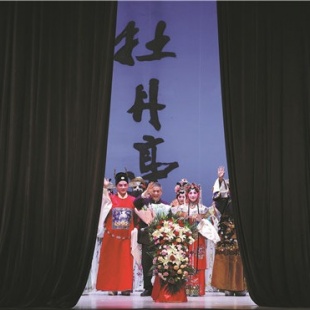Kunqu Opera is a hard act to follow


Pai as a child didn't understand what Kunqu Opera was all about; he was only impressed by the art form's beauty and the warm feedback of the audience. Gaining his degree in English literature from a local university and his master's degree in literary theory and creative writing at the University of Iowa, Pai became a professor of Chinese literature at the University of California, Santa Barbara, and lived there for over three decades until his retirement in 1994. His many works include Taipei People and New Yorkers.
It was in 2002, when Pai was invited to give a lecture on Kunqu Opera in Hong Kong, that he was inspired to produce the youth edition of The Peony Pavilion. Kunqu Opera faced a great challenge back then from modern life, and few people went to theaters to watch the old art form. "I wanted to let young people enjoy the beauty of Kunqu Opera. I wanted to build up a profound dialogue between the past and the present," Pai says.
For his lecture in Hong Kong, Pai not only narrated the history and cultural significance of Kunqu Opera but also had young performers display the singing and movements of The Peony Pavilion, an innovation that was widely praised by the students.
The original play, known for its intricate portrayal of love and longing, was a cornerstone of Chinese literature and drama. A beautiful young woman named Du Liniang falls in love with Liu Mengmei, a handsome scholar she meets in her dream. She wakes up and finds that her longing for the man is so strong that it gradually causes her to fall ill and die. After her death, she persuades the judge of the underworld to grant her permission to return as a ghost to find him. She eventually finds Liu, who is temporarily staying at her family temple where she is buried. Their powerful love brings Du back to life, and they live happily ever after.
"The Peony Pavilion is just like William Shakespeare's Romeo and Juliet, which is timeless and embraced by different cultures. The difference is that Chinese people love a happy ending, so the couple conquered death and reunited," Pai says.
His version was specifically tailored to resonate with a younger audience, infusing the classic narrative with elements that appeal to modern sensibilities while preserving its historical essence. He invited Kunqu Opera actor Yu Jiulin and actress Shen Fengying to play the roles of Liu and Du, both in their 20s in 2004, similar in age as the targeted audiences.





































